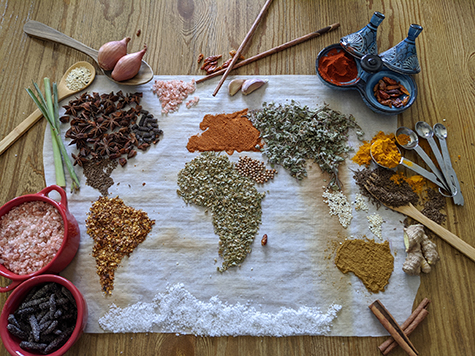Introduction: Russian cuisine and its unique flavors
Russian cuisine is famous for its hearty and filling dishes, bursting with flavors and aromas. From rich stews to savory pies, Russian cuisine offers a unique perspective on Eastern European gastronomy. However, one of the most distinctive features of Russian cooking is the use of spices and herbs. Russian chefs are known for their ability to create complex and layered flavors that enhance the natural taste of ingredients and create a harmonious balance on the plate.
The role of spices and herbs in Russian cooking
Spices and herbs play a crucial role in Russian cooking, as they add depth and complexity to dishes while also providing a range of health benefits. Many traditional Russian spices and herbs have been used for centuries, and they are an integral part of the culinary culture of the country. From fresh herbs like dill, parsley, and chives to bold and earthy flavors like black pepper and mustard, Russian spices and herbs are a testament to the country’s rich culinary heritage.
Traditional spices: dill, parsley, and chives
Dill, parsley, and chives are perhaps the most commonly used herbs in Russian cooking. They are used to flavor soups, stews, salads, and even pickles. Dill is particularly popular, and it is used extensively in dishes like borscht, a traditional Russian beet soup. Parsley and chives add a subtle flavor to dishes, and they are often used as a garnish.
Bold and earthy flavors: black pepper and mustard
Black pepper and mustard are two of the most commonly used spices in Russian cooking. While black pepper adds a bold and spicy flavor to dishes, mustard provides a tangy and slightly sweet taste. Both spices are used in marinades, sauces, and rubs, and they are particularly popular in meat dishes like beef stroganoff.
The fragrant and aromatic world of Russian herbs
In addition to dill, parsley, and chives, there are several other herbs commonly used in Russian cooking. Tarragon, for example, is a fragrant herb that is used to flavor vinegars, sauces, and chicken dishes. Lovage, also known as Russian celery, has a strong flavor similar to parsley and is often used in soups and stews. Other popular herbs in Russian cuisine include bay leaves, thyme, and sage.
Conclusion: Enhancing your culinary skills with Russian spices and herbs
While Russian cuisine may seem intimidating at first, incorporating some of the country’s traditional spices and herbs into your cooking can be a great way to add new flavors and aromas to your dishes. Whether you’re looking to recreate traditional Russian recipes or experiment with new flavor combinations, exploring the world of Russian spices and herbs is sure to enhance your culinary skills. From the bold flavors of black pepper and mustard to the delicate aroma of dill and tarragon, Russian spices and herbs offer an exciting and unique perspective on the world of gastronomy.

